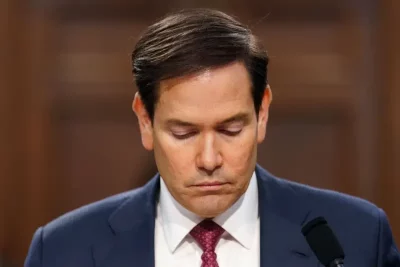
The US government’s attempt to interfere with the Federal Supreme Court (STF), with threats to Minister Alexandre de Moraes, is the result of “excessive arrogance” and an alleged stance of “Imperator Mundi” (Emperor of the World) of President Donald Trump, the former BBC of Celso de Mello told BBC News Brazil.
For the retired minister and president of the court between 1997 and 1999, the Supreme Court made no decision that interferes with US domestic matters and the White House acts to guarantee immunity to suspects of crimes committed in Brazil.
“In the Brazilian case, there was, at any time, by the Supreme Court, any determination that could characterize improper interference in US domestic matters or interference in the exercise of the internal jurisdiction of that country.”
“Simply to do so that such matters (domestic matters and internal jurisdiction) are submitted to the exclusive political and legal domain legitimized by American sovereignty!” He continued, in a written response.
The Trump government targets authorities in many countries that have been active to regulate digital platforms or made decisions against users who would be committing crimes on social networks.
In recent years, Moraes has suspended platform accounts or has determined the arrest of people who would have made undemocratic speeches and threatened Brazilian authorities in the virtual environment, reaching large US -based companies.
He is currently rapporteur for criminal proceedings on an alleged attempted coup d’état led by former President Jair Bolsonaro.
Deputy Eduardo Bolsonaro (PL-SP), son of the former president, is licensed by office, living in the United States, where he tries to articulate a retaliation of the Trump government to Moraes-which led to the opening of a criminal investigation against the parliamentarian to investigate alleged attempted obstruction of justice.
It was in this context that the US Secretary of State, Marco Rubio, said on Wednesday (28/5) that visa restrictions will be announced against foreign authorities that are “an accomplices of censorship to Americans”, without directly quoting the Brazilian minister.
The previous week, however, Rubio threatened Moraes with possible sanctions provided for in Global Magnitsky law. This American legislation allows for other punishments to foreign authorities accused of corruption or serious human rights violations, such as the prohibition of any person or company in the US from carrying out economic transactions with the sanctioned individual.
“This is under analysis right now, and there is a great possibility that this happens,” Rubio said when questioned by Republican Deputy Cory Mills of Florida, a parliamentarian who has dialogue with Eduardo Bolsonaro.
Amid the threats, the president of the Supreme Court, Minister Luís Roberto Barroso, scheduled for next Wednesday (04/06) the resumption of the judgment of Marco Civil da Internet, which had been suspended since December by a request for view (more time for analysis) of Minister André Mendonça.
In this action, the Court analyzes whether digital platforms should be held responsible for third party content if they fail to take the necessary arrangements to remove posts with criminal content.
To BBC News Brazil, Celso de Mello criticized the movement of the US government and said that Trump disrespects “the sovereign equality of national states”, provided for in the United Nations Charter (UN).
“The attempt to want to interfere, politically and diplomatically, in internal matters in Brazil, branding measures with the authoritarian (and irresponsible) objective to press and influen the direction of a criminal case in our country, motivated by very serious accusations, can only result from the excessive arrogance of those who act so unacceptable (and contradictory) to act as true” presidential ” (or inadmissible “Imperator Mundi”) ”, replied the retired minister in writing.
For Celso de Mello, the Trump government seeks to support a “erasula” thesis that the first amendment to the United States Constitution, which guarantees freedom of expression and other rights, would be valid outside the US territory and would prevent Brazilian authorities from acting “even if the unlawful ones committed by US nationals or foreign residents in the US have been perpetrated in Brazilian territory”.
“Brazilian authorities and public agents are based on the performance of their functions, so they provide the constitution and the laws of (our) republic!”, He wrote to the report.
Eduardo Bolsonaro has met with republican parliamentarians in Washington, such as Cory Mills | Reproduction/X
It is unclear what kind of measure is being considered against Moraes. For Celso de Mello, an action restricted to visa refusal to enter the country would be different from broader sanctions.
“Finally, it is different, I understand, the situation in which the US-as much as Brazil and any other foreign state-deliberate restrictions on the granting of” visas “, because, in this specific case, the control of movement of foreigners (admission and exit) is based on the sovereign power that any state has in the international order,” he explained.
“It is, in fact, of discretionary power based on the sovereignty of national states, except for such states to agree on international conventions that celebrate with other foreign states,” he said.
What can happen to Alexandre de Moraes?
There are three main consequences for those who are placed within the list of sanctioned from the magnitsky law:
- prohibition of travel to the US;
- Freezing goods in the US;
- prohibition of any person or company in the US from carrying out economic transactions with the sanctioned individual.
This last item is the one that often causes bigger problems to people who are sanctioned by the US, says Redress’s lawyer Natalia Kubesch – British entity that helps victims of torture and human rights abuses worldwide – in an interview with BBC News Brazil.
Does this mean, for example, that Moraes credit cards can be canceled – even if issued by banks in Brazil – as Visa, Mastercard and American Express are American card companies?
In theory, yes. But not necessarily. Decisions like this would need to be analyzed on a case by case basis by financial institutions. Kubesch states that there are precedents in which this happened.
“American Express announced last year that client accounts had ended [sancionados pela Lei Magnitsky]. They probably had calls with the Government of Iran, so the operator completely ended these client accounts, ”says the lawyer.
“Similarly, in 2022, Visa, Mastercard and American Express blocked certain Russian banks from their payment networks after the imposition of sanctions.”
And the social media accounts of Alexandre de Moraes? Could US sanctions force US -based companies – like Google, Meta, and X – to cancel the Brazilian judge’s accounts?
Kubesch states that there is a “gray legal zone” about it.
“Being sanctioned does not forbid him from having an account on a social network. And companies like Twitter and Facebook would not necessarily violate sanctions by allowing someone to have an account,” says the lawyer.
This is because vetoing a person’s access to a mass communication platform because of sanctions would be seen by many as a violation of his right to freedom of expression, says Kubesch.
“But there is a gray area because accounts on social networks can be used to allow or facilitate the potential prohibition of a sanction, or may promote your specific agenda,” says the lawyer.
“There are precedents where Facebook blocked accounts of Russia’s chief Chuchena, sponsored by Kremlin in 2017 after he was sanctioned,” says Kubesch.
“There are precedents of media platforms to block accounts after the imposition of sanctions, but this can also sometimes be a proactive approach [das empresas de mídias sociais]instead of being a direct violation, a result of which they would have to act. ”
The lawyer says that the inclusion of people on the list of sanctions by Magnitsky law is “semilegal” and “semi -political”.
“The sanctioned person must be involved in serious human rights violations, and this is a legal test that needs to be fulfilled. Now or not, imposing a sanction, ultimately, is at the discretion of the relevant government authorities.”
 In Congress, Marco Rubio stated that the US government is analyzing the possibility of applying sanctions against Minister Alexandre de Moraes | Will Oliver/EPA-EFE/Shutterstock
In Congress, Marco Rubio stated that the US government is analyzing the possibility of applying sanctions against Minister Alexandre de Moraes | Will Oliver/EPA-EFE/Shutterstock
The expert says that Alexandre de Moraes’s possible framing in sanctions by magnitsky law would be uncommon, considering how the law is often used.
“This person [Moraes] It would probably not be subject to sanctions under magnitsky law in the UK, ”says Kubesch, referring to British law of the same nature – Canada and the European Union also have their own magnitsky laws.
“In the United Kingdom, you can only be sanctioned and subject to magnitsky sanctions if you are involved in a serious violation of the right to life, the right not to be tortured and the right not to be enslaved. And none of these cases applies here in particular, so it would not be eligible to magnitsky sanctions under the United Kingdom law.”
She points out that, under the new government of Donald Trump, there seems to be changes in the inclusion or exclusion of the list of American sanctions.
The US government recently removed Israeli settlers in the West Bank that were implicated in human rights abuses and an authority of the Hungary government that had been sanctioned by the government of former President Joe Biden for corruption.
Originally published by BBC News Brasil on 05/30/2025
By Mariana Schreiber
Source: https://www.ocafezinho.com/2025/06/01/trump-age-como-pretenso-imperador-do-mundo-ao-ameacar-stf-afirma-ex-presidente-do-tribunal/

